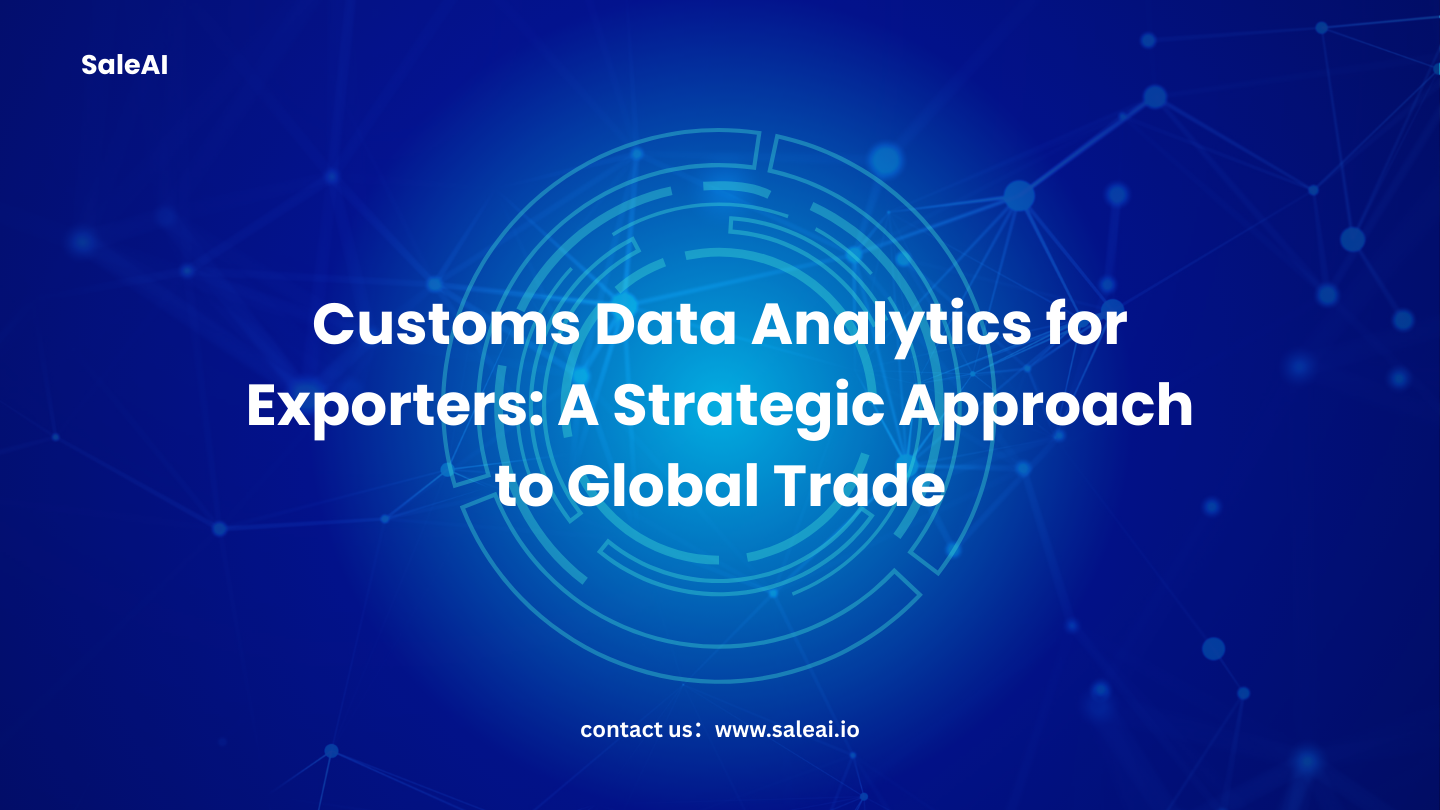Unlocking the Power of Customs Data Analytics
Customs data holds immense potential for exporters. Every transaction, shipment, and trade route generates valuable information that can provide critical insights into market dynamics, buyer preferences, and competitor activities. Yet, the sheer volume and complexity of this data often make it inaccessible to small and medium-sized enterprises (SMEs).
Customs data analytics tools resolve this challenge by transforming raw data into actionable intelligence. They empower exporters to access real-time information, uncover new opportunities, and refine their global trade strategies. Among these tools, SaleAI stands out as a powerful solution that simplifies and optimizes customs data analysis for exporters worldwide.
What is Customs Data Analytics?
Customs data analytics involves the systematic examination of customs transaction records to derive insights that inform trade decisions. These records typically include:
- Import and export details.
- Product descriptions and HS codes.
- Buyer and seller information.
- Shipment values and volumes.
- Trade routes and shipping methods.
By analyzing these data points, businesses can identify market trends, evaluate demand for products, and gain a competitive edge.
Why Traditional Methods Fall Short
Relying on traditional methods to analyze customs data can be both time-consuming and limiting. Challenges include:
- Overwhelming Data Volume: Customs data spans billions of transactions globally, making it nearly impossible to analyze manually.
- Data Complexity: Understanding and interpreting raw customs data requires expertise in trade regulations, HS codes, and market trends.
- Lack of Accessibility: Many businesses lack access to comprehensive and up-to-date customs data.
- Slow Decision-Making: Manual analysis delays the ability to act on market opportunities.
These limitations make advanced tools like SaleAI essential for businesses aiming to leverage customs data effectively.
How SaleAI Revolutionizes Customs Data Analytics
SaleAI combines advanced AI algorithms with extensive global customs data to deliver a seamless analytics experience. Here’s how SaleAI adds value to exporters:
a. Extensive Data Coverage
SaleAI provides access to over 8 billion customs data points across 130+ countries. This comprehensive coverage enables businesses to:
- Explore new markets with detailed buyer and product data.
- Identify high-demand regions for their products.
- Monitor trade activity across multiple industries.
b. Real-Time Data Insights
SaleAI ensures that users have access to the latest data, allowing them to:
- Respond quickly to market changes.
- Avoid outdated or irrelevant information.
- Make timely decisions that drive growth.
c. Buyer and Supplier Traceability
SaleAI allows businesses to trace buyers and suppliers through their transaction histories. This feature helps exporters:
- Verify the credibility of business partners.
- Understand buyer procurement trends.
- Build a reliable and transparent supply chain.
d. Market Trend Analysis
SaleAI’s analytics tools identify trends such as:
- Emerging product demands and market shifts.
- Seasonal variations in trade activity.
- Competitor supply chain strategies.
e. AI-Generated Reports
With just a few clicks, SaleAI users can generate detailed reports that highlight actionable insights. These reports are tailored to specific industries and markets, enabling businesses to:
- Develop targeted marketing strategies.
- Optimize pricing and product offerings.
- Gain a competitive advantage in global trade.
Key Benefits of Customs Data Analytics
a. Enhanced Market Understanding
Customs data analytics provides a deep understanding of global market dynamics, helping exporters identify lucrative opportunities.
b. Improved Buyer Targeting
By analyzing buyer behavior, businesses can focus their efforts on high-value prospects, improving conversion rates and ROI.
c. Competitive Intelligence
Insights into competitor activities enable businesses to adjust their strategies and stay ahead in the market.
d. Risk Mitigation
Customs data analytics helps businesses identify potential risks, such as market saturation or supply chain disruptions.
e. Efficient Resource Allocation
Data-driven insights allow businesses to allocate resources effectively, reducing waste and maximizing profitability.
Practical Applications of Customs Data Analytics
a. Identifying High-Potential Buyers
SaleAI’s tools enable exporters to find buyers who are actively importing similar products, increasing the likelihood of successful deals.
b. Exploring New Markets
Customs data analytics highlights regions with high demand for specific products, helping businesses enter new markets confidently.
c. Monitoring Competitor Activity
By analyzing competitor trade data, businesses can gain insights into their strategies, such as pricing, product offerings, and buyer relationships.
d. Optimizing Supply Chains
SaleAI helps businesses identify reliable suppliers and streamline their supply chain operations, reducing costs and improving efficiency.
e. Supporting Compliance Efforts
Customs data analytics ensures that businesses stay informed about trade regulations and compliance requirements, minimizing the risk of penalties.
Why Choose SaleAI for Customs Data Analytics?
SaleAI offers a unique combination of robust features, user-friendly design, and cutting-edge technology. Here’s why it’s the ideal choice for exporters:
- Comprehensive Coverage: Access data from 130+ countries and industries.
- Real-Time Updates: Stay informed with the latest trade data.
- Automated Insights: Save time and focus on actionable recommendations.
- Scalability: Suitable for small businesses and large enterprises alike.
- Cost Efficiency: Reduce the need for expensive consultants or manual research.
Future Trends in Customs Data Analytics
The field of customs data analytics is evolving rapidly. Key trends to watch include:
- AI-Powered Predictive Analytics: Future tools will predict market trends with even greater accuracy.
- Integration with Blockchain: Combining customs data with blockchain technology will enhance data transparency and security.
- Advanced Visualization Tools: Improved visual interfaces will make complex data easier to interpret.
Exporters who adopt customs data analytics tools like SaleAI today will be well-positioned to capitalize on these advancements.
Conclusion: Transform Your Trade Strategy with SaleAI
Customs data analytics is no longer a luxury—it’s a necessity for exporters aiming to succeed in global markets. By turning raw data into actionable insights, tools like SaleAI enable businesses to identify opportunities, mitigate risks, and drive sustainable growth.
With its extensive data coverage, real-time updates, and AI-generated reports, SaleAI is the ultimate solution for businesses looking to harness the power of customs data analytics. Take the first step toward smarter, data-driven trade strategies today.





